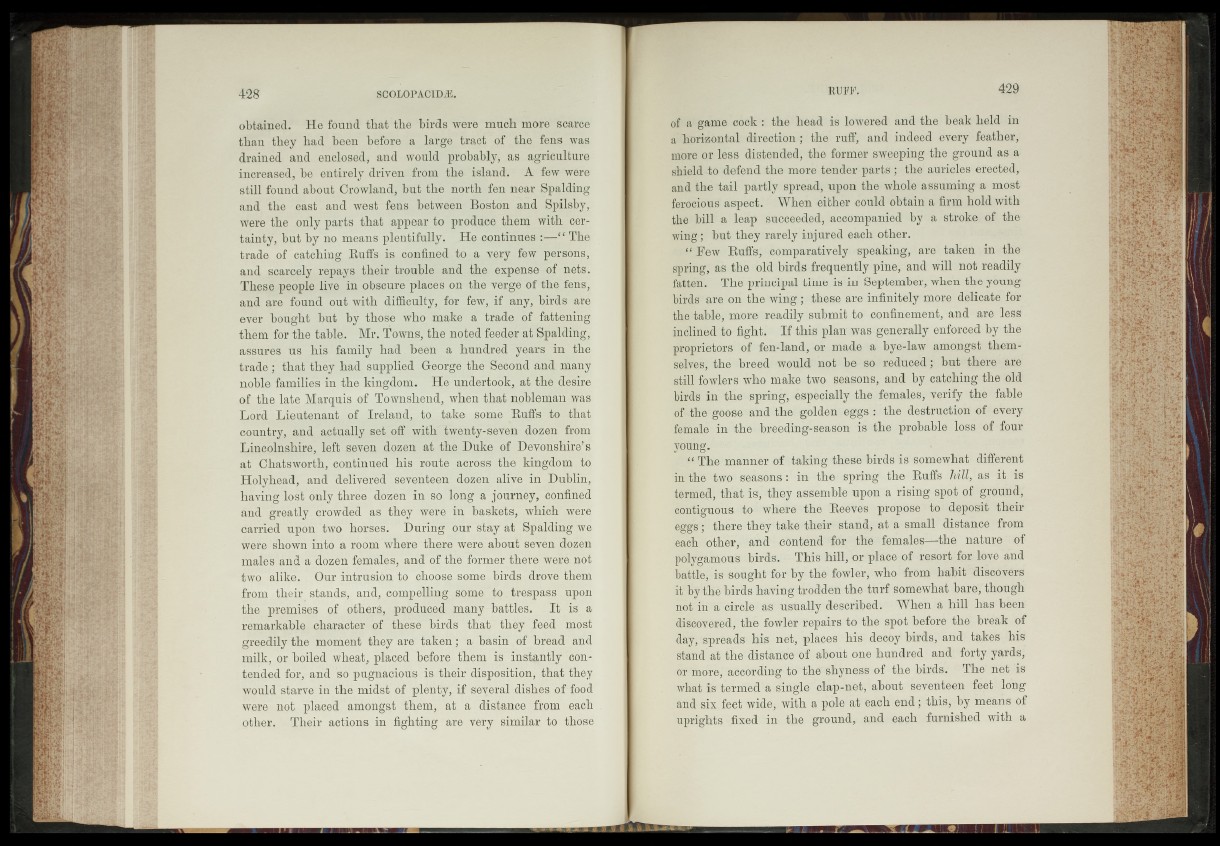
obtained. He found thatthé birds were much more scarce
than they had been before a large tract of the fens was
drained and enclosed, and would probably, as agriculture
increased, be entirely driven--from the' island; A few wére
still found about ..Crowland, but the north fen near J^palding
and the east and west fens between Boston and Spilspy,
were the only parts that appear to produce them with certainty,
but by no means plentifully; He continues :—“ The
trade of catching Ruffs is,confined. to ay^ry.few persôns,
and scarçely repays ,their trouble and the expense -of pets.
Thpsp people live in obscure places on thV vergeof the |ens,
and are found out with''difficulty, for few, if any, birds a ||
ever bought but by those''who make a trade/ of fattening
them for the table. ' Mr. Towns, the U‘é|ef.rfeeder'at"Spalding,
assures us bis family had been a hundred ymrs in: Me
trade; that they had supplied?fxeor^^^ many
noble families in the "kingdom: He undertook at the, desire
of the l|te Marquis of Townsl^end^;wbem that npB’lemanwâs
Lord Lieutenant pf Ireland, Ta take me JEtuffs to', that
country, and, actually .set off with T w e . p t glozen h'oin
Lincolnshire,Tift' seven dozen at^tSgiHuke of DèmÆ^^r^
at "Chats worth, continued'pis route across the kingdom 'to
Holyhead, ^anay delivered* sevehteçn' dozen^âLiyê u n ,Dublih,
having lqst only Jhrhe dozen Ip so, long a journey; co in e d
and greatly . crowded' as Iphey' wbpe, ip baskets^ hvliiplf .were”
carried upon. Wo horses. During; opr stay "S p a ld in g ;we
were shown into a room where ’there were about seven tjbzen
males ""and a^Uolen females, and of the former thoi’eywera not
Two^alike. Our in tru siS jo choosy some. birds’ drove them
from ,their stands, and» conme|hng sopie to Trespass .upon
the Premises of others, p ro d u c t' many-hattleïu'J,r I t is a
remarkable character %ofThese birds that“ t Imÿ Toen ^most
gibêetily the mppmt they aref taken ; h- basin. of bread ‘ and
milk, or hoi\ed^>\heap placed before them is. jnst^ntly bôn-
; ^opded tqr, and so pugWcTous js'their disposition, thajTthey
wpuld starve in the midst'of plenty, i | several dishôi b'f"food
werhwphL-plahed * amongst“- them, at a distanco “from each
_.pther.jb ffheir actions in fighting are \ < n "lnul if to tll<>"<
of a game ebek: the head is lowered and the beak held in
a bbrisontal direction ; the ruff, and indeed every feather,
more or less distended, the former sweeping the ground assia
shield do'defend tbe^more tender-parts ; the auricles' erected"
and the tail- pfoflyispread, up®.® fhb whole- assuming a most
ferocious^ aspect.' ' When'either could obtain a firm hold with-
the^hill a leap "succeeded; accompanied' b yNa stroke», of the
wing r^but they-rarely, injured each- other: -$
“ Few -Ruffs, Comparatively speaking, are-taken in th e
spring, as the Aldohirds- frequently -pine, and will not readily
fatten, Whe principal time is in September, when the young
birds'are oh the w in g ; these are infinitely'more delicate foT
tfie table, morePTi’eadily submit,to? confinement, and-are leSs‘
inclihbdTo fight.’ I f this plan was generally enforced by the-
■proprietors^ 'of fen-land, or made a bye-law amongst themselves,
the breed"would ngfc be so induced; but there-^are
sffif fhwtexs who make two seasons, and by catching, the old
birds in^tlie -spring, especially dher- females^werify the'Table
ofTh^gooSetahdibe^goldeHieggs^ithe destruction of^eVeiy
female in tbellb^eO chb gWe a son ‘is^th'e’-probable loss b*>f four
yohngv&!;
'■^mWhe manner of taking 1#<§ke?birds is^SoMeWhat* different
in'the two’- seasons : in the^^pring-the^Rujffs hill,*£§’■'it
tpiSefl, -that/ts^they a^mblfe^npon' a ri|i^W > sf|^ t# g r^ a g d ,
contiguous /#o^Where -the JReeves p ropose‘Tbbdeposit tbgir
egga'^-fthere they4tafk@Th®^ stand,- &'t?a*small distance?from
each ftthJr/'and^.,contend ffdr the females—the nature «of
p0fygamou'S;‘birds*.- -Tb&lfrll, or'piaceofi resort f ^ f e p e and
batirle-u^isb^ht^ffiriby the* fowler* who from habit'rdfscovers
^ h y th e birds'havirtgTrodden fheTurf so'ffiewhat -barb/though'
as .usually 'described! When a hill- has ■ beeh;
.-hoovered'-‘/the fowler RepairsTh^the* spot' before;' th.ef break of
day, "'spreads his n ^ ;places ‘h i# decoy birds, and takes -hih
stand atdhe' distance-Of about -one-hundred/ and fety-yards*
6r,m^fej'%nc©irdingtlt? the;'-shynens--of>€he-biKds. The net
what isTermed^a single' elap-filt?, about -'seventeen '-feet,, long
and- sixf^.et'Wid6’ with a pole T this, by "means of
uprights 'fi®ed/im -the ground, and each furnished with a